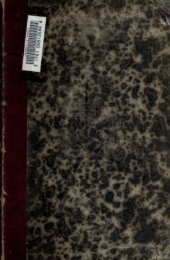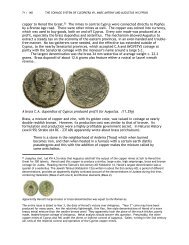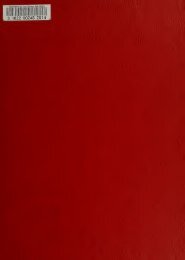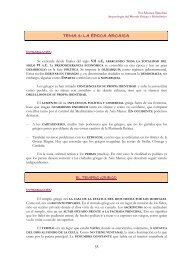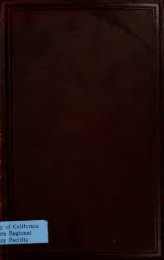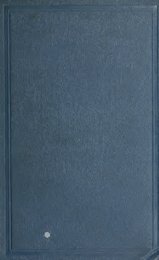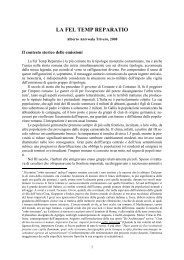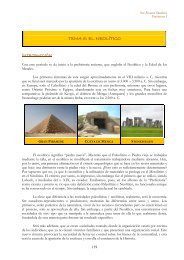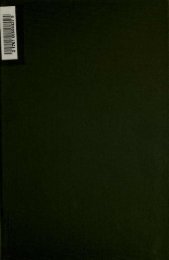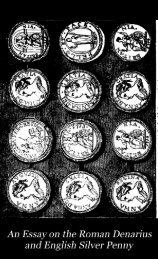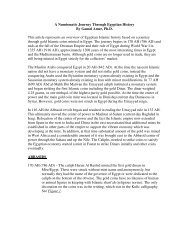Numismata hellenica: a catalogue of Greek coins; with notes, a map ...
Numismata hellenica: a catalogue of Greek coins; with notes, a map ...
Numismata hellenica: a catalogue of Greek coins; with notes, a map ...
Create successful ePaper yourself
Turn your PDF publications into a flip-book with our unique Google optimized e-Paper software.
the erection <strong>of</strong> its walls by Apollo and Alcathous, Eu.<br />
72 : its <strong>coins</strong> as member <strong>of</strong> the Achaian League, Eu. 4.<br />
Megara (Siciliae), the lesser Hybla so called after receiving<br />
a Grecian colony, Ins. 60 : its inhabitants removed to<br />
Syracuse by Gelon, Ins. 70.<br />
Megarsa or Magarsa perhaps the same place as Hieropolis<br />
CiUciae ; its virorship <strong>of</strong> Minerva, who was called i) 9ed<br />
Mayaotrig ;<br />
its ruins near the old mouth <strong>of</strong> the Pyramus,<br />
As. 67.<br />
Meleager represented by the <strong>coins</strong> <strong>of</strong> iEtolia, Eu. 7.<br />
androgynous figure on the<br />
Meliboea (Thessaliae), the capital <strong>of</strong> Philoctetes;<br />
tion and <strong>coins</strong>, Eu. l6l.<br />
its situa-<br />
Melite, now Malta, its <strong>coins</strong>, Ins. 62.<br />
Melus, description <strong>of</strong> its <strong>coins</strong>, Ins. 25.<br />
Menae or Menena (Sicilias), now Mineo, its <strong>coins</strong>, Ins. 62.<br />
Menandrus, described as king <strong>of</strong> Bactria by Strabo,<br />
Appian, Plutarch, and Trogus Porapeius, but shown by<br />
a comparison <strong>of</strong> his <strong>coins</strong> <strong>with</strong> those <strong>of</strong> Demetrius son<br />
<strong>of</strong> Euthydemus to have reigned over the Paropamisus<br />
and the country S. E. <strong>of</strong> the Indian Caucasus, K. 55.<br />
Mende (Pallenes) celebrated for its wine, whence the types<br />
<strong>of</strong> its <strong>coins</strong> ; Mendseus an epithet <strong>of</strong> Bacchus, Eu. 73.<br />
Mesambria, or Metambria, or Mesembria (Thracise), on<br />
the western roast <strong>of</strong> the Black Sea; a colony <strong>of</strong> Megara<br />
and Calchedon ; its extant <strong>coins</strong>, Eu. 73.<br />
Mesma, Medma, or Medama colonized from Locri;<br />
situated on the river now called Mesima, Eu. 128.<br />
Messana (Sicihae), previously Dancle or Zancle, colonized<br />
by <strong>of</strong>fsets from Cumae in Italy and Naxus in Sicily ;<br />
taken by Anaxilaus <strong>of</strong> Rhegium, Ins. 62 : its inhabitants<br />
removed to Tyndaris by Dionysius I., and their places<br />
occupied by a mixed population <strong>of</strong> Doric origin, Ins. 63 :<br />
seized by Mamertine mercenaries about 280 a.c, and<br />
governed by them till the reign <strong>of</strong> Augustus, Ins. 62, 63 :<br />
temple <strong>of</strong> Cora Pelorias in its citadel, Ins. 64.<br />
Messene (Peloponnesi), its <strong>coins</strong> as member <strong>of</strong> the Achaian<br />
League, Eu. 4 : its chief deities Ceres, the Dioscuri,<br />
Jupiter Ithomatas, Asclepius, and Messene, daughter<br />
<strong>of</strong> Triopas, Eu. 74.<br />
Metallum, now Matala, the harbour <strong>of</strong> Phaestus Cretae,<br />
Ins. 30.<br />
Metapus or Metapontium, this name derived from Metapa,<br />
a city in the jEtolian plains, near the Achelous ; said to<br />
have been founded by Epeius, the fabricator <strong>of</strong> the<br />
and richness <strong>of</strong> its<br />
Trojan horse ; fertility <strong>of</strong> its territory<br />
silver coinage, Eu. 128 : colonized by Achseans under<br />
Leucippus, after having fallen to decay ;<br />
on its <strong>coins</strong>, Eu. 129; its Doric temple, Eu. 128, and<br />
INDEX TO THE NOTES. [29<br />
hence his head<br />
corrigenda.<br />
Methana (Argolidis), the head <strong>of</strong> Vulcan on its <strong>coins</strong> ex-<br />
plained by the volcanic nature <strong>of</strong> the peninsula, Eu. 74.<br />
Methymna or Mathymna (Lesbi), now Molivo, the mythus<br />
<strong>of</strong> Areion and the dolphin referred to on one <strong>of</strong> its <strong>coins</strong>,<br />
he having been a native <strong>of</strong> the city, Ins. 25.<br />
Metropolis (Acarnaniae) a Corinthian colony,<br />
its <strong>coins</strong> <strong>with</strong> Corinthian types, Eu. 75.<br />
Eu. 8 : hence<br />
(loniae), its remains in the plain <strong>of</strong> Turbalij<br />
this latter name perhaps a Turkish corruption <strong>of</strong><br />
M;)rpd7roXic, As. 81.<br />
(Phrygiae) on the great road from Ephesus to<br />
Caesareia Cappadociae, between Apameia and Philomelium.<br />
As. 82.<br />
, two cities in Thessaly so named, one in ThessaUotis,<br />
near the present Blazdhu, the other (now Turnavo)<br />
in<br />
Pelasgiotis ;<br />
Eu. 75.<br />
<strong>coins</strong> <strong>of</strong> the former alone extant,<br />
Midaeium (Phrygiae) situated on the river<br />
between Dorylaeum and Pessinus, As. 82.<br />
Thymbrius,<br />
Midas the reputed founder <strong>of</strong> Midaeium and Prymnessus<br />
Phrygiae, As. 82. 103.<br />
MiletopoUs (Mysiae) a colony <strong>of</strong> Cyzicus ; the two owls<br />
on its <strong>coins</strong> explained by Cyzicus having been an<br />
Athenian colony; the neighbouring lake Miletopolites,<br />
now Maniyas, As. 83.<br />
Miletus founder <strong>of</strong> the city <strong>of</strong> that name in Asia ; his<br />
mythus alluded to on a coin <strong>of</strong> Cydonia Cretae,<br />
Ins. 14.<br />
Miletus (loniee), reference <strong>of</strong> the types <strong>of</strong> its <strong>coins</strong> to the<br />
worship <strong>of</strong> Apollo at Didyma in its territory, As. 83.<br />
Mines <strong>of</strong> silver in Macedonia, K. 1 : <strong>of</strong> gold and silver in<br />
Thrace, K. 19. Eu. 81. 157: <strong>of</strong> silver in Attica, Eu.<br />
21 : <strong>of</strong> gold and silver in Siphnus, Ins. 41 : <strong>of</strong> copper<br />
near Perperene, As. 98.<br />
Minoa probably, the Mtvvn mentioned by Stephanus,<br />
As. 84. 155, and corrigenda.<br />
Minyae, sovereigns <strong>of</strong> Western Bceotia, their chief town<br />
Erchomenus, Eu. 52.<br />
Mithradates made king <strong>of</strong> Bosporus by Claudius ; subse-<br />
quently deposed by him, K. 48.<br />
III., king <strong>of</strong> Pontus, the Pontic aera (297 b.c.)<br />
commenced in his reign, K. 47.<br />
VI. (Eupator), the Great, ejects Pylaemenes<br />
<strong>of</strong> Paphlagonia from his kingdom, K. 43.<br />
Mithras, his worship at Tarsus proved by the types on<br />
some <strong>of</strong> its <strong>coins</strong>. As. 128, 129.<br />
Mna a word <strong>of</strong> Phoenician origin, and an Athenian weight,<br />
containing before the time <strong>of</strong> Solon 73 drachmae, afterwards<br />
100, 1].<br />
Molon <strong>of</strong> Media made satrap by Antiochus III. <strong>of</strong> Syria ;<br />
revolts, and defeats his generals; is defeated by Antiochus<br />
and destroys himself and family ; Seleucid date<br />
on his <strong>coins</strong>, K. 65.<br />
Molossi, their territory separated from the sea by that <strong>of</strong><br />
the Cassopaei, Eu. 33.<br />
Molossis (Epiri), its mint perhaps at the modern Dhra-<br />
misius, Eu. 75.<br />
Monas, an Egyptian weight represented in hieroglyphics<br />
by the vulture (mother), the same as the Jewish " shekel<br />
<strong>of</strong> the sanctuary ;" introduced by the Phoenicians into<br />
Lydia and Corinth, 2]. See Weight.<br />
Monunius, his capital at Dyrrhachium lUyriae; styled<br />
Paai\ii)e on a coin <strong>of</strong> Dyrrhachium, Eu. 159.<br />
Mopsium or Mopsuestia (Cilicise), now Mensis, named<br />
Mampsista or Mansista under the Byzantine empire;<br />
altar <strong>of</strong> Mopsus, son <strong>of</strong> Teiresias, on one <strong>of</strong> its <strong>coins</strong>.<br />
As. 84 : death <strong>of</strong> Seleucus VI. <strong>of</strong> Syria there, K.<br />
36.<br />
Morgantium (Siciliae) so called from the Morgetes, an<br />
Italian tribe, who settled in the plain <strong>of</strong> the Simaethus<br />
and its vicinity, Ins. 55. 64.<br />
Mostene (Lydiae) in the district <strong>of</strong> Hyrcania; both places<br />
colonized by Macedonians, As. 84.<br />
Motya (Siciliae) a commercial station <strong>of</strong> the Phoenicians,<br />
afterwards colonized by <strong>Greek</strong>s; destroyed by Dionysius<br />
I., and its inhabitants soon after removed to Lilybaeum<br />
by Himilco, Ins. 65 : the dog on one <strong>of</strong> its <strong>coins</strong><br />
allusive to its fabled foundation by Egestes, Ins. 56.<br />
See Segesta.<br />
Mummius destroys Corinth in 146 b.c, Eu. 39.<br />
Mutilus, Caius Papius, Consul <strong>of</strong> the Italian League 80<br />
B.C., Eu. 125.<br />
Mycalessus (B<strong>of</strong>otiae), its situation on the Euripus, Eu. 75 :<br />
a coma <strong>of</strong> the district <strong>of</strong> Tanagra ; its walls still extant,<br />
Eu. 88.<br />
Mygdonia, a name given by the Macedonians to the north,<br />
western part <strong>of</strong> Mesopotamia, As. 88.<br />
Mylasa, the chief city <strong>of</strong> Caria, and the residence <strong>of</strong> its



